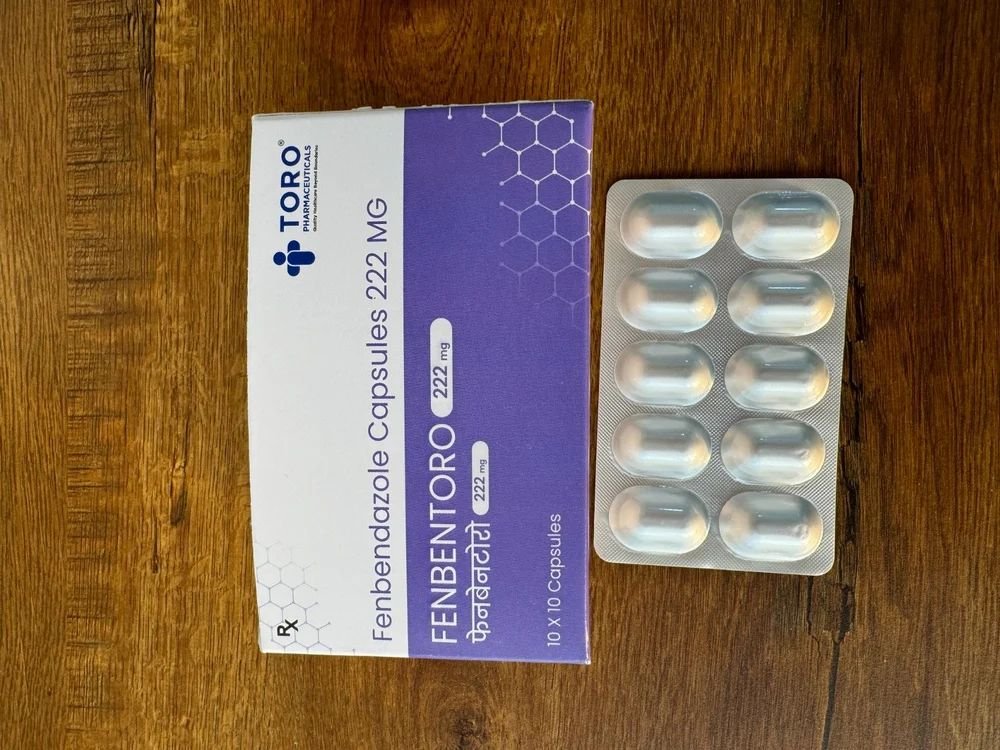fenbendazole 222: Frequently Asked Questions
Wiki Article
Exploring the Mechanisms Behind Fenbendazole and Its Influence On Animal Health
Fenbendazole is a widely utilized anthelmintic known for its efficiency against numerous bloodsuckers. Its key mechanism includes the restraint of microtubule development, which disrupts crucial procedures in these pathogens. Beyond its antiparasitic residential properties, fenbendazole also shows up to boost immune reactions and has anti-inflammatory benefits. Comprehending these complex effects might disclose new applications for pet wellness. Inquiries continue to be regarding its full potential and security account.The Pharmacokinetics of Fenbendazole
The pharmacokinetics of fenbendazole, a widely utilized anthelmintic in veterinary medication, entails the study of its absorption, distribution, metabolism, and excretion within animal systems. After administration, fenbendazole is rapidly absorbed from the intestinal system, with peak plasma concentrations taking place within hours. Its distribution is influenced by factors such as tissue binding and lipid solubility, enabling it to penetrate numerous tissues properly. The medication goes through comprehensive metabolic rate mainly in the liver, where it is exchanged active and non-active metabolites. These metabolites contribute in the medication's total efficacy and security account. Excretion happens largely via feces, with a smaller sized percentage gotten rid of through urine. The half-life of fenbendazole varies among varieties, which affects application programs. Understanding these pharmacokinetic properties is crucial for maximizing its restorative use and making certain effective bloodsucker control in vet practices.Devices of Activity Against Bloodsuckers
Fenbendazole exerts its antiparasitic impacts primarily with the restraint of microtubule formation in bloodsuckers. This disruption influences their architectural integrity and mobile features, resulting in damaged energy metabolism. Therefore, the drug successfully endangers the survival and recreation of various parasitical microorganisms.Inhibition of Microtubule Formation
Inhibition of microtubule formation represents an important mechanism whereby specific anthelmintic representatives, consisting of fenbendazole, exert their impacts on parasites. Fenbendazole binds to tubulin, a protein that creates microtubules, interrupting the polymerization process needed for microtubule setting up. This disturbance hinders essential mobile functions, consisting of mitosis, intracellular transport, and architectural stability. As microtubules play an essential duty in preserving the shape and feature of parasitical cells, their restraint causes cell cycle arrest and ultimate death of the parasite. This mechanism is particularly efficient versus nematodes, as their reliance on microtubules for wheelchair and nutrient absorption makes them vulnerable to fenbendazole. The restraint of microtubule development is a critical aspect of fenbendazole's therapeutic efficacy in veterinary medicine.Interruption of Power Metabolism
Interrupting power metabolic process is another vital mechanism by which fenbendazole targets parasitic organisms. This anthelmintic alters the power manufacturing paths within parasites, mostly influencing their capacity to produce adenosine triphosphate (ATP) By preventing glucose uptake and disrupting mitochondrial feature, fenbendazole restrictions the power sources crucial for the survival and recreation of these microorganisms. Because of this, parasites come to be significantly prone to ecological anxieties and immune feedbacks. The interference in energy metabolic rate not only influences the bloodsuckers straight however likewise lowers their capability to assimilate nutrients, further hindering their growth - fenbendazole 444. Generally, the disruption of power metabolic process represents a basic aspect of fenbendazole's effectiveness versus numerous parasitical infections, contributing considerably to improved pet wellness end resultsPotential Adverse Effects and Safety Account
The possible negative effects and safety profile of fenbendazole warrant careful factor to consider, specifically in vet applications. While usually considered as safe, some pets might experience adverse responses, consisting of gastrointestinal disturbances such as vomiting and looseness of the bowels. In addition, neurological signs and symptoms, although rare, have been reported in sensitive people, highlighting the requirement for tracking during treatment.
Fenbendazole's safety in numerous types, including pets and felines, has been documented, however dosage and period of treatment must be very carefully managed to minimize risks. Expecting or lactating animals may also call for unique interest, as the results on developing unborn children or nursing spawn are not totally understood.
Normal vet consultations can assist minimize possible side effects and guarantee the medicine is administered suitably. Consequently, while fenbendazole is a reliable anthelmintic representative, caution regarding its negative effects is necessary for maintaining animal health and wellness.

Fenbendazole's Influence on Immune Feature
Fenbendazole has actually been kept in mind for its prospective to regulate immune system feedbacks in animals. Its anti-inflammatory residential or commercial properties may contribute to boosted immune function, supplying a dual advantage in taking care of health (fenbendazole 222). Understanding these results is vital for reviewing fenbendazole's role in veterinary medicineBody Immune System Modulation

Anti-inflammatory Residences
Anti-inflammatory impacts stand for a significant element of fenbendazole's influence on immune function. Research study shows that fenbendazole might lower the manufacturing of pro-inflammatory cytokines, which are essential in mediating inflammatory reactions. By modulating these cytokines, fenbendazole can potentially alleviate inflammation-related conditions in pets. This anti-inflammatory activity not just help in taking care of signs connected with different illness but also boosts general immune system efficiency. Furthermore, its capability to promote a balanced immune feedback assists stop too much inflammatory damages, which can result in chronic health concerns. Consequently, fenbendazole's role in inflammation management underscores its value in veterinary medicine, providing a dual benefit of antiparasitic activity and body immune system support for animal wellness.Applications Beyond Standard Parasitic Infections
While primarily identified for Web Site its performance versus different parasitical infections, fenbendazole has actually garnered focus for potential applications past this standard scope. Current research studies suggest that fenbendazole might have beneficial results on cellular health and wellness and immune response, making it an intriguing candidate for taking care of other wellness conditions in pets. For example, its reported anti-inflammatory residential or commercial properties may supply alleviation for animals struggling with persistent inflammatory diseases. In addition, some research indicates that fenbendazole can contribute in supporting the total health of pets by enhancing vitamins and mineral absorption and intestinal health and wellness. Its prospective as a complement treatment in cancer cells therapy has actually stimulated passion, as initial searchings for suggest it might inhibit tumor cell growth view it now in specific contexts. These varied applications highlight fenbendazole's convenience, urging more expedition into its multifaceted benefits for animal wellness past its standard use as a deworming agent.Future Study Directions and Effects for Animal Health And Wellness
The expedition of fenbendazole's potential applications has opened up brand-new avenues for research study focused on boosting animal health and wellness. Future research studies can concentrate on its efficiency versus a more comprehensive range of microorganisms, consisting of microorganisms and infections, thereby broadening its function in veterinary medication. The effects of fenbendazole's devices, such as its impact on immune modulation, warrant additionally examination to comprehend how it can reinforce overall health and wellness in numerous varieties.In addition, research may explore ideal does and formulations to make best use of effectiveness while reducing potential adverse effects. Checking out fenbendazole's synergistic effects with various other medicines could bring about extra efficient therapy procedures. Longitudinal studies reviewing long-lasting outcomes in animals treated with fenbendazole can supply important understandings right into its safety and security and effectiveness. In general, the ongoing exploration of fenbendazole uses promising capacity to improve pet health and wellness, necessitating a collective approach amongst scientists, veterinarians, and pharmaceutical programmers to facilitate innovations in this field.
Frequently Asked Concerns
Can Fenbendazole Be Made Use Of in Livestock for Parasite Avoidance?
The question of whether fenbendazole can be utilized in animals for bloodsucker prevention matters, as manufacturers seek effective therapies (fenbendazole 222). Study indicates it may supply advantages, but appropriate standards and vet guidance are necessary for secure useWhat Is the Recommended Dosage of Fenbendazole for Different Pets?

Exist Any Kind Of Recognized Medicine Communications With Fenbendazole?
Existing expertise shows that fenbendazole might connect with particular medicines, possibly impacting fenbendazole their effectiveness or metabolism. Veterinary professionals advise seeking advice from a vet to examine private animal cases and determine any kind of feasible interactions before administration.Just How Does Fenbendazole Contrast to Other Antiparasitic Medications?
Fenbendazole is frequently compared to other antiparasitic drugs based upon effectiveness, spectrum of task, and security profiles. It is preferred for its performance against a wide variety of bloodsuckers while normally displaying minimal side effects in pets.Is Fenbendazole Effective Versus Viral or Bacterial Infections in Pets?
The effectiveness of fenbendazole versus viral or microbial infections in animals continues to be unverified. Research largely concentrates on its antiparasitic properties, with restricted evidence sustaining any duty in treating non-parasitic infections in vet medicine.Report this wiki page